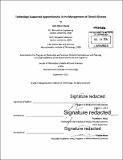Technology-supported apprenticeship in the management of chronic disease
Author(s)
Moore, John Oliver
DownloadFull printable version (15.33Mb)
Other Contributors
Massachusetts Institute of Technology. Department of Architecture. Program in Media Arts and Sciences.
Advisor
Franklin H. Moss.
Terms of use
Metadata
Show full item recordAbstract
Chronic disease is the most important cause of morbidity and mortality worldwide, but the current standard of care is woefully ineffective. It is paternalistic, episodic, and perversely incentivized based on volume, resulting in poor outcomes at extraordinary cost. Technology-supported apprenticeship is a model of chronic disease management that embraces the contribution of the patient. It is collaborative, continuous, and designed to achieve value through improvement in the experience, clinical outcomes, and cost of care. In this model, patients are the novice apprentices of master clinicians. A software platform called CollaboRhythm provides applications on mobile phones and tablets as scaffolding for collaboration. Tracking tools document progress, visualizations highlight associations between actions and outcomes, and personalized decision support encourages self-efficacy. Powerful virtual visits and instant messaging allow master clinicians to provide adaptive coaching within the context of daily life rather than in the artificial environment of the office. Apprentice patients have the potential to become master coaches themselves; thus producing an exponentially scaling health ecosystem at minimal cost. Two randomized, controlled trials were conducted to evaluate if technology-supported apprenticeship could augment the "best of the best" in office-based care and scale it via virtual deployment. Apprentice patients for basal insulin titration at the Joslin Diabetes Center were more satisfied with their care than controls, achieved better outcomes (-3.1% vs. -2.5% HbA1C), and did so with minimal increase in cost ($206). Those for hypertension management at the Massachusetts General Hospital were also more satisfied with their care, achieved better outcomes (-26.3 vs. -15.9 mmHg SBP), and did so with negligible increase in cost ($14). Over a longer period of time, apprenticeship is projected to produce better outcomes at decreased cost. Technology-supported apprenticeship has extraordinary potential, but the paternalistic culture of medicine and its volume-based economic model present significant impediments. Future work needs to address longer durations of coaching, greater numbers of apprentices per coach, patients as coaches, other chronic diseases, and patients with comorbidities.
Description
Thesis: Ph. D., Massachusetts Institute of Technology, School of Architecture and Planning, Program in Media Arts and Sciences, 2013. 109 Cataloged from PDF version of thesis. Includes bibliographical references (pages 83-91).
Date issued
2013Department
Program in Media Arts and Sciences (Massachusetts Institute of Technology)Publisher
Massachusetts Institute of Technology
Keywords
Architecture. Program in Media Arts and Sciences.